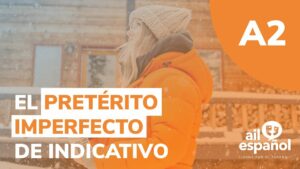Anki vs Quizlet vs Memrise for Language Learning: Which is Your Flashcard Hero?
Do you also envy modern youth's access to shortcuts and convenience?
Back in the day, when I was learning my first foreign language, I felt on cloud nine when I got my hands on an original movie videotape. Doesn’t it sound surreal nowadays?
To memorize new words, I spent hours cutting out paper flashcards (man was I tickled pink when I got my first laminator that made them durable).
The flashcard approach worked wonders – this comes from a person speaking six and almost speaking two more languages, so you might want to take my word for it – but it was time consuming! By the way, here’s a great list of tips on how to create effective flashcards.
Today, language learners can choose from a variety of flashcard apps. No more scissor-and-paper mess.
Spoiler Alert #1: I personally use Memrise for my two new languages.
Spoiler Alert #2: It doesn’t mean you should necessarily use Memrise as you may prefer a different learning style.
Spoiler Alert #3: If you think there’s a flashcard app that, alone, will teach you a new language – forget about it! It's a learning complement, not your ultimate solution.
On Your Mark!
In this review, I’ll be talking about three competing apps that have become popular due to their flashcard function: Anki, Quizlet, & Memrise.
They all offer user-generated content in numerous subjects, whether you're learning sciences or arts. We’re primarily interested in how they facilitate language learning, though.
Meet each of them below:
Go, Anki!
First launched as a flashcard website in 2006 in California, Anki now offers 48 languages.
It’s a completely free learning platform aimed to help students around the world drill their memory using a flashcard system. The idea itself is based on a scientifically proven method of spaced repetition.
You have a few options to access Anki:
- AnkiWeb (a bit limited web version)
- Anki Desktop (a downloadable computer version for Mac, Windows, or Linux)
- AnkiDroid (a free Android app)
- AnkiMobile (a paid IOS version)
The iPhone Anki app is very different from the Android app. It was even created by other developers using the Anki idea.
Go, Quizlet!
A year younger than Anki, Quizlet was also born in California.
Andrew Sutherland, the founder, came up with the idea to create an online learning platform back in 2005. He was getting ready for his French test and saw how great the flashcard method worked. I’m a sucker for lead-by-example stories, and I immediately got hooked by Quizlet's.
Today, Quizlet accommodates more than 60 million users and offers five languages. You can find user-made flashcards in basically any other language, though.
Quizlet is accessible as a web version, a computer version (you’d need a desktop app emulator), and app version for Android and IOS users.
Go, Memrise!
Memrise is the youngest in this flashcard app family. It was launched in 2010 in Great Britain and has grown to list 35 million users from all over the world.
The platform was conceived by two memory genii: a holder of Grand Master of memory, Ed Cooke, and a memory neuroscientist, Greg Detre.
Memrise kicked in the industry’s door loudly and started competing against other products.
You can use the Memrise website or download the app via Google Play Store or App Store. There's no desktop version.
Memrise offers 23 languages but doesn’t restrict you to them when it comes to creating or downloading user-generated flashcards.
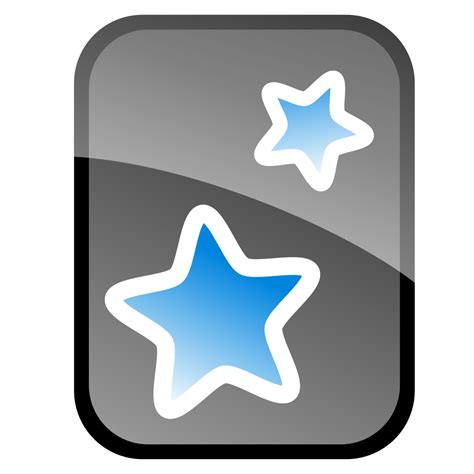
Strengths:
- Free subscription
- Offline mode
- Wide language selection
- Huge pool of flashcards
- Spaced repetition technology
- Adding audio recordings & images to flashcards
- Importing ready decks
- Can create your own flashcards manually
Weaknesses:
- Pricey IOS app version;
- No quality control for user-generated flashcards
- Plain, clunky user interface;
- No synchronization between devices
- No web version
- No interactive features
- No autosuggestions & spellcheck

Strengths:
- Free version & affordable subscription
- Offline mode & synchronization across devices
- User-friendly interface
- Text-to-speech technology
- Engaging, gamified activities
- Adding audio files & images to flashcards
- Autosuggestions & spellcheck
- Ease of creating your own flashcards
- Ease of importing ready decks
Weaknesses:
- Only five available languages
- No quality control for user-generated flashcards
- No spaced repetition (since 2020)
- Annoying ads in the free version
- Limited features in the free plan

Strengths:
- Free version & affordable subscription
- Wide language selection
- Gamified exercises
- Numerous study modes
- Spaced repetition technology
- Ease of creating flashcards
- User-friendly, aesthetically pleasing interface
Weaknesses:
- No quality control for user-generated flashcards
- No autosuggestions & spellcheck
- No option to add audio files and images to flashcards
- Fewer languages with the app than with the website
You can base your choice of a language learning app on this section if you spot a game-changing aspect (e.g., you desperately need an image-add option).
I’d still recommend that you read further to look inside these flashcard apps and gain a better feel for each one's key features.
By the way, you can use this review which covers the top five flashcard apps for learning languages.
FAQ: Is Quizlet better than Duolingo?
Quizlet is very different from Duolingo. Although it also has some interactive exercises, Quizlet is primarily a flashcard app. Its focus lies in vocabulary and memorization. In turn, Duolingo has more comprehensive lessons that touch upon other language aspects, too.
Who’s Winning the Race?
PRICING – Anki 🏆
Easy to use, effective, and free – who wouldn’t like this?
Is it even fair to judge anything that doesn’t carry a price tag?
All three apps offer free versions. But there are some "buts". Let’s look into them to see which app wins this round.
Anki. Anki is completely free for Android users. Yes, you’ve read it right – completely. For IOS users – there's a one-time payment of $25 for lifetime access.

Quizlet. Quizlet’s free version is decent, but I’d strongly recommend getting Quizlet Plus if this is the flashcard app you decide to commit to for a long-term learning journey.
For the pocket-friendly price of $2.99/month, you’ll enjoy its offline version, loads of study modes, flashcard creation extras, grading and progress features, and an ad-free learning experience.
If you want my honest opinion, this price tag is more than fair considering all the bells and whistles.
As a language instructor, I appreciate that this platform offers a Quizlet Plus plan for teachers (with improved production and assessment tools). Preparing lessons with Quizlet is a dream come true for those who’ve been sweating over cut outs and racking their brains every time a test comes up.

Memrise. Memrise's free version is fine, but you can do a seven-day trial to see whether you'd like a paid plan (it turned out I did want one). There’s a money-back guarantee, so you shouldn’t have any second thoughts about it.
Memrise is quite affordable at $8.99/month given that it offers far more than flashcards. I’d still say it's worth your money only if you’re learning more than one foreign language (I’m currently learning two and using the app for two others I teach).

User Experience – Memrise 🏆
Anki. The Anki app isn’t blessed with good looks. It’s that ugly friend everyone wanted as a teenager so they'd look more attractive in their company. I’m not exaggerating. Literally, any other language learning app I’ve tried wins judging by its interface (Sorry, Anki, I’m trying to be honest here. You’re a four).
Anki looks so basic you can’t help but crave some glitz and a few more bold fonts.
It also takes time to get used to the software. You might even want to read a manual in the help section. But honestly, I never got to it – if I make up my mind about learning a language, I hardly have an urge to page through guides before I start. Does anyone?

Quizlet. For me, Quizlet strikes a good balance between attractive and minimalist. In the battle of Anki vs Quizlet, the latter wins by a landslide victory. It's aesthetically pleasing yet not too flashy or distracting.
You sign up and immediately feel the app is your good, old friend. Everything’s super logical and intuitive, and you have just as many tabs and buttons as you need. Without any manuals, you can start learning languages immediately.

Memrise. Be it Anki vs Memrise or Quizlet vs Memrise, Memrise wins. It just makes the aesthete inside me bounce with joy. I love a pretty interface, and it’s where most flashcard apps lose me. Memrise was my love at first sight – we clicked, and I stayed for a few languages.
Memrise’s color palette is bright but not too saturated; its layout is animated, but it doesn’t divert your attention from the content (although you might at first get the feeling there are too many tabs).
The navigation is so simple you can use the Memrise app with your toddler (seriously, my two-year-olds are learning some basic vocabulary with me).

Activities & Flashcards – Memrise 🏆
Anki is as straightforward as it gets. The Anki app was created to make and use flashcards, nothing more and nothing less. Period. Anki decks are a digitalized version of your old paper-cut decks.
What two options can you explore with Anki?
- Creating your own flashcard decks from scratch
- Importing flashcard decks made by other users


How do you use Anki decks? You see a flashcard, and you should guess (I recommend saying it out loud to work on pronunciation) the translation, article, or (like in my German example) preposition used with the verb.
The system asks you to rate the difficulty of every phrase to decide on the frequency of showing you this phrase again.
You can also add notes and remarks in the Edit section, which I find extremely helpful.

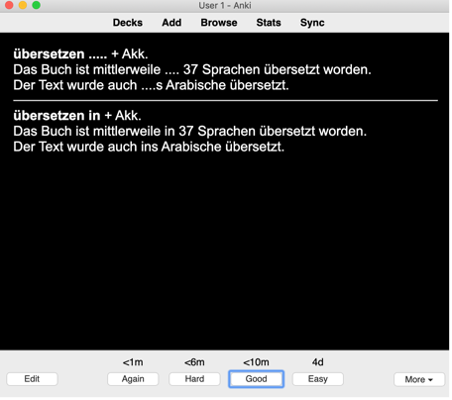

With Anki, you experience some variety on the cards, depending on the topic and flashcard creator. It can be good and reliable content or it can be a poorly made deck (so I like having my own decks more than using someone else's).
For instance, there may be an audio file embedded in the card or you might be requested to type in a word rather than just guess it. This way, you do some basic listening and writing drill on top of your vocabulary practice.


Do you know the downside to it all? You get bored as heck. But hey, learning languages isn’t always bells and whistles.
Quizlet goes the extra mile to hook its users. To instill positive feelings and emotions into the users, the Quizlet app developers came up with a bunch of learning and game modes (against Anki’s one mode) and two games:
- Flashcards (to flip between questions and answers/words and translations)
- Learn (to select correct answers)
- Write (to type correct answers)
- Spell (to type the answer you hear in the audio file)
- Test (to do matching, multiple choice, ad true/false exercises)
- Match (to link the word to its definition) and Gravity (to quickly type the correct word)
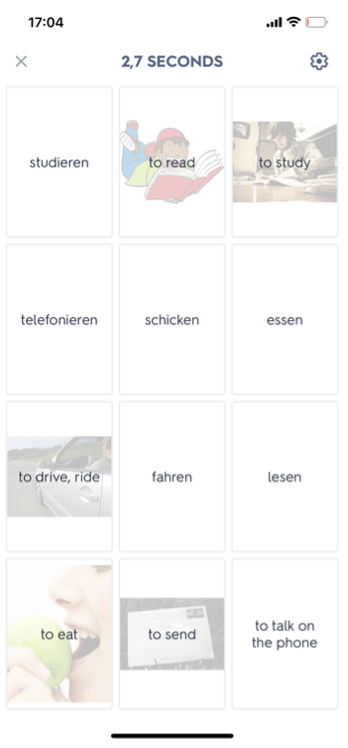


What does a Quizlet flashcard look like? In a sense, Quizlet, although advertised as a flashcard app, resembles gamified language learning apps like Duolingo. In a battle of Anki vs Quizlet, the latter has an edge if you can’t focus on monotonous tasks.
A Quizlet flashcard is a flip card: you have a word or phrase on one side and its translation or a definition on the other side. You’re allowed to add images, which enhance memorization if you’re a visual language learner.


Memrise is a caring guide. Memrise takes you by the hand and walks you through various activities. To me, it isn’t a traditional flashcard app as it disposes of many other interactive features, too.
What does your standard session look like?
You log in and see a set of Memrise-recommended activities based on your target language, level, and daily goal of words to learn. Then, you visit a large library of topics where you can practice flashcards.

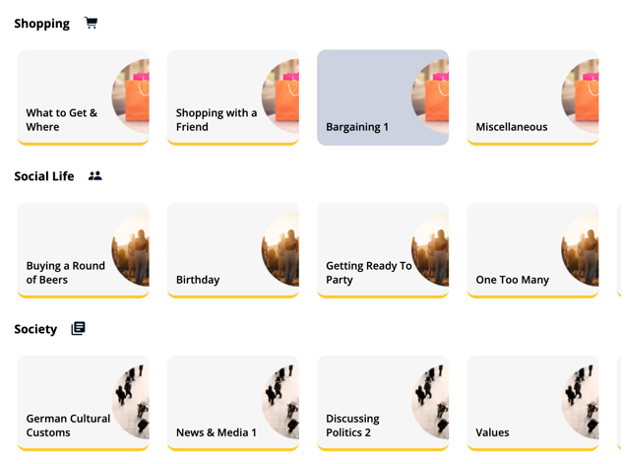
You’re always requested to mark words as easy, difficult, or known so the system moves them to a respective section. You won’t be asked to revise or drill the known vocabulary. You will instead repetitively see the phrases you’re not yet familiar with.
Memrise has a bunch of exciting study modes: learning words, learning grammar, reviewing and speed reviewing, listening, and pronunciation. You’ll hardly feel bored with this app.

What does a Memrise flashcard look like? The card isn't necessarily word based. Memrise cards may automatically play video recordings that accompany phrases, for instance.
I love how Memrise makes your learning experience more rewarding by making you "water" a plant assigned to each deck. You see the plant grow as you progress through the deck. To me, it’s a great metaphor for growing as a speaker and language user. In the battle of Anki vs Memrise, this engagement helps the latter win by an overwhelming margin.

Content Creation – Quizlet 🏆
Language learners like all three flashcard apps because of the opportunity to easily create flashcards. But is there any difference in how you do this with each app? Let’s see.
Anki is an app for patient people. Anki boasts of user-generated flashcards (and I love using them myself). Now, creating your own deck isn’t something an impatient person can handle. The procedure itself seems self-explanatory, but it’s too much work and time for one deck (especially vs Memrise & Quizlet).
While you can do it all automatically, in bulk, with the other two flashcard apps, Anki expects you to type in every single word, one by one. On a positive note, it’s easy to add images and voiceover for the cards (albeit also one by one).
I made just a short five-word deck for the purpose of demonstrating how it goes. I honestly love the functionality, but the process isn’t for choleric users like me.
P.S.: To use the "importing" function – you'd need to spend quite some time with the manual (again, vs Memrise & Quizlet with self-explanatory procedures).
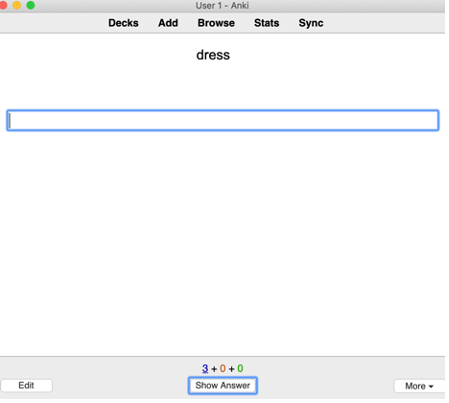


Quizlet is my flashcard crush. When it comes to flashcard creation, I’m in love with Quizlet. It absolutely beats the competitors.
The entire experience of adding vocabulary feels like a game. It’s intuitive, fast, and rewarding.


You just add a few words or sentences and receive a whole bunch of activities: flashcards, matching, speed matching, and true/false exercises. What struck me most of all was the automatically generated correct audio file.
Here’s just a tiny bit of what I received when I created my "German Clothing" deck with Quizlet.



Memrise is a flashcard-style icon. Memrise is a fun tool to create flashcards. It’s also super easy if you know what result to expect. You just go to "Courses" on the main page and select "Create a Course". You can create complex language courses here, but we're focusing on flashcards at this point.
I tried making a "clothing vocabulary" deck for German. I loved how fast it went, and how the software automatically gave me some exercises with practice words.
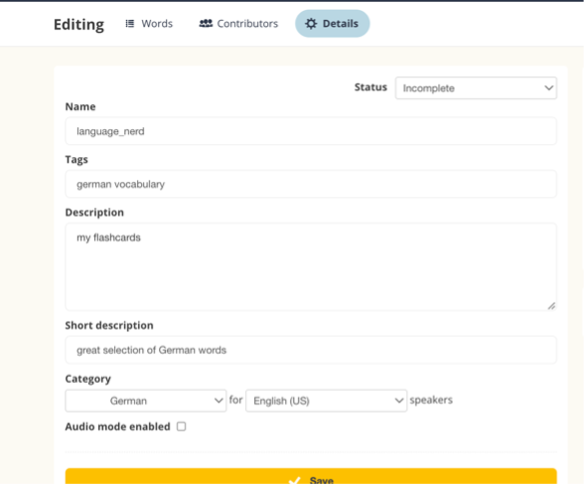

And once again I'm hooked by the aesthetics of the tool. Just check these colors and layout. If there were a fashion-show battle among flashcard apps, Memrise would get the first prize.
The only problem is that the tool doesn’t automatically add audio recordings the way it’s done by Quizlet (Quizlet wins in the Quizlet vs Memrise battle).


Bottom line: You might also want to check FluentU. This learning platform primarily focuses on listening skills, but I’m a sucker for its flashcard functionality.
Spaced Repetition – Anki 🏆
Spaced repetition technology (SRT) is a scientifically proven technique that ensures memorization. As language learning – especially vocabulary – is heavily dependent on (sometimes boring and mechanical) memorization, it’s important not to ignore this part.
Back in the day when I used paper flashcards, I was struggling with arranging proper revision intervals. They were mostly haphazard and non-systematic. Today, flashcard apps like Anki and Memrise have this function embedded and do the "counting" for you.
Disclaimer: Quizlet dropped it a few years ago, which is more than weird given that the technique is undoubtedly the quintessence of flashcard learning.
Anyway, this section is about the battle of Anki vs Memrise.
Anki gives you control. The app requests that you rate the word’s difficulty on a scale from "need to see it again" to "it’s easy". This way, it sets adequate intervals for you to revise the word and reminds you to do so, which is called spaced repetition.
You can manually adjust the repetition intervals. In the bottom "More" pop-up list, select "set due date" and pick the interval for any specific phrase. You can also flag a card or add notes.


Memrise does the work for you. Memrise first shows you the entire vocabulary list and lets you look through the deck to mark phrases as known (ones you won’t see again at all) and difficult (ones you’ll see in many tests). The system doesn’t tell you exactly which intervals to expect.
The revision differs from Anki’s. Memrise offers a variety of activities, and you’ll be using a new word in multiple-choice tests, translation exercises, and others (instead of just revising it in flashcards).


While Memrise is more modern and automated, my trophy goes to Anki in this round. Anki gives me more control over the vocabulary. This way, I don't risk missing out on words.
FAQ: How Good Is Memrise?
Memrise is a decent app, especially if you're a language newbie. It allows you to use multiple flashcards and create your own decks to drill vocabulary. It also offers exciting pronunciation and listening activities.
However, Memrise is a beginner-to-intermediate app. At a later stage, you’ll receive little benefit from it. You can still use the flashcard features as an advanced student if you create your own decks, though.
Unique Features: Quizlet 🏆
Okay, we got it – all these flashcard apps work well to teach you new vocabulary. But are there any special treats they offer?
Anki appeals with its database and reputation:
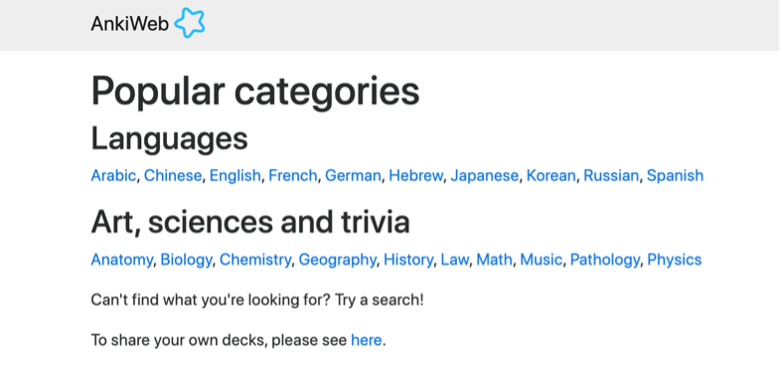
It features the largest flashcard database – AnkiWeb – and offers the most generous selection of disciplines and decks without any limitations.
- It gives you access to the highest number of languages – 48 languages in the software program and 14 languages on the apps. It even has special study modes for dementia and Alzheimer’s people.
- It relies on the spaced repetition system, one of the most scientifically robust, workable techniques for long-term learning. The system is wired to make you remember new words perfectly. Given that you rate the level of difficulty of every phrase, you practice a very personalized revision approach.
Quizlet offers fantastic extras
- It offers a scan mode (for upgraded users only), where you can automatically create flashcards using class notes or other materials. I’ve tried it with French, the language I’m currently learning, and I fell in love.
- It features the homework solution option. Unless you misuse it as a cheating tool to avoid doing homework, it’ll boost your learning outcome. Tracing mistakes and learning to fix them is an effective and workable approach to language learning.
- The program has an interactive testing mode to assess what you’ve learned. It’s a fantastic tool for both students and language instructors.

Memrise takes you beyond flashcard learning

- It relies on the spaced repetition technique, like Anki and unlike Quizlet. Memrise makes this revision invisible for you – you just encountered new phrases in exercises and aren’t explicitly reminded of them as unknown.
- It places much emphasis on native speakers’ pronunciation and grammar. With Memrise’s flashcards, you can hear a few speakers saying out loud the same sentence. It’s essential to drill your ear.
- Memrise has great Tik-Tok-style immersive videos. You hear native speakers holding short dialogues filled with conversational phrases, and that’s as close to real-life teaching as it gets.
FAQ: Is Anki or Quizlet better for language learning?
At the beginning of your language journey, you might be drawn toward Quizlet due to its interactive features and a better-developed interface. However, Anki might be a more attractive choice later. It offers spaced repetition, which becomes increasingly important as you acquire a larger vocabulary base.
Who’s the Champion? – Memrise🏆🏆🏆
Like with anything in our life, there’s no one-size-fits-all or black-and-white solution.
You can see I’ve claimed each app as a winner twice, which shows how I find certain features better in Anki and for others in Memrise or Quizlet.
All things considered, my final choice is Memrise, although I’d ideally want to take all the good things from each and make a new app. Disclaimer: Our upcoming Flying Languages app might be that perfect app, by the way (stay tuned!).
If you’re impatient to try one of the reviewed apps before you have a chance to get hold of Flying Languages though, here’s the final face-to-face battle.
Use Anki if you:
- Are fine with a plain interface
- Have other learning tools to drill your skills beyond flashcards
- Are learning a rare language not covered by the other apps
- Are on a budget and don’t plan to pay for any extras
- Will be mindful of potential spelling mistakes
- Are fine with downloading software
Subscribe to Anki here.
Use Quizlet if you:
- Learn one of the popular European languages
- Don’t mind paying extra for Quizlet Plus
- Want the testing option
- Want a variety of exercises apart from flashcards
- Need the homework solution option
- Will control your spaced repetition yourself
Subscribe to Quizlet here.
Use Memrise if
- Don’t mind paying extra for extra features
- Seek a one-in-all app rather than a flashcard app
- Crave a flash interface workspace
- Want to focus on grammar rules and pronunciation
- Want to have fun while learning
- Don’t plan to create many flashcards yourself
Subscribe to Memrise here.
There’s no ultimate winner or loser in this race. All in all, you may have a different learning style than I do.
I honestly believe any of these can be your language hero if you practice speaking, writing, and reading elsewhere and only regard Anki, Quizlet, or Memrise as your digital flashcard helper.
FAQ: Can you become fluent with Anki?
The idea behind this app was to develop learner-centered software that would allow for personalization and individual learning pace. It's a decent flashcard tool that can be effectively combined with other language learning resources. Unfortunately, it can't bring you to the level of a fluent speaker if used in isolation.

